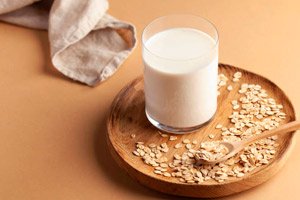
All iLive content is medically reviewed or fact checked to ensure as much factual accuracy as possible.
We have strict sourcing guidelines and only link to reputable media sites, academic research institutions and, whenever possible, medically peer reviewed studies. Note that the numbers in parentheses ([1], [2], etc.) are clickable links to these studies.
If you feel that any of our content is inaccurate, out-of-date, or otherwise questionable, please select it and press Ctrl + Enter.
Oat milk may increase hunger and cause blood sugar spikes
Last reviewed: 09.08.2025

A study published in Applied Physiology, Nutrition, and Metabolism raises important questions about the metabolic impact of plant-based milk alternatives. In two crossover, randomized clinical trials, researchers compared how cow’s milk, oat milk, soy milk, and almond “milk” affected glucose levels, satiety hormones, and feelings of hunger after meals.
Purpose of the study
The researchers wanted to find out whether milk substitutes affect metabolism in the same way as real milk, especially in conditions similar to everyday consumption - for example, in a cup of morning coffee.
Key Results
1. Glycemic response:
- Coffee with oat milk caused a significantly higher spike in blood sugar levels - 25-30% higher than with cow's milk.
- Soy and almond milk elicited moderate to low glycemic responses, roughly comparable to conventional milk.
2. Hormonal response and appetite:
- Participants who consumed oat milk showed reduced production of insulin and peptide YY, key satiety hormones.
- One to two hours after drinking the oat-based drink, subjects reported feeling hungrier than after drinking cow's milk or soy milk.
3. Subjective feeling of satiety:
- Only cow's milk and soy milk provided a sustained reduction in appetite until the next meal.
- Almond milk had a moderate effect, while oat milk had virtually no effect.
Possible explanations
- Oat milk contains a lot of fast-digesting carbohydrates (maltose), which explains the high glycemic index.
- Unlike cow's milk and soy milk, it contains almost no protein, and protein plays an important role in stimulating satiety hormones.
- It also lacks saturated fat, which slows down digestion and helps keep you feeling full longer.
Practical significance
- For people with type 2 diabetes, insulin resistance, obesity, or those simply watching their blood sugar levels, oat milk may not be the best choice.
- At the same time, soy milk has shown metabolic response rates similar to cow's milk and may be the most balanced alternative.
- Almond milk showed average results and may be an acceptable choice depending on your goals.
Researchers' commentary
"Not all plant-based alternatives are created equal in terms of metabolic health. Our data suggest that the choice of 'milk' should take into account not only taste preferences or food allergies, but also its impact on blood sugar levels and feelings of satiety," said lead author Dr Michael Gregson.
Directions for future research
The researchers plan to:
- To study the response in people with diabetes and prediabetes.
- Test fortified oat milk formulas with added protein or fiber.
- To analyze the long-term effects of different types of "milk" on weight and risk of metabolic diseases.
Conclusion
This study is an important reminder that plant-based does not always mean neutral. Oat milk may be green and delicious, but it may not be the best choice in terms of glycemia and appetite control. Choosing a milk substitute should be conscious and personalized, especially for those with metabolic disorders.
